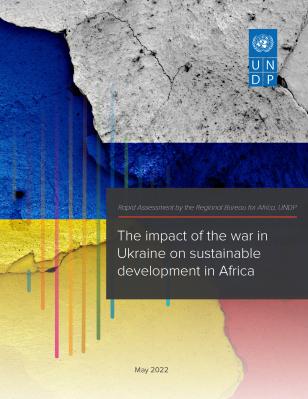The impact of the war in Ukraine on sustainable development in Africa

The impact of the war in Ukraine on sustainable development in Africa
May 24, 2022
The war in Ukraine comes at a time when African countries are still struggling to recover from the destabilizing effects of the global COVID-19 pandemic, which caused deep economic regression, significant loss of productivity, worsening inequalities, planetary pressures, and in some cases security challenges. It is threatening to derail development progress in African countries, pushing the 2030 Sustainable Development Goals and the aspirations of the African Union’s Agenda 2063 further out of reach.
The direct impacts of the crisis in Africa include trade disruption, food and fuel price spikes, macroeconomic instability, and security challenges. The crisis pushed the price of a barrel of Brent oil above the $100 dollar mark for the first time since 2014. At the same time, food grain prices continued to rise even higher as supply disruptions from Russia and Ukraine (actual and anticipated) rocked global markets. Food and fuel account for over one-third of the consumer price index in most African countries. The pass-through of consequent inflation will be swift and hard-hitting, especially for vulnerable groups like women and children.
There are also indirect impacts of the crisis to consider, which include imported inflation, difficult energy transitions, and a potential geopolitical realignment. To fully diversify, Europe will have to search for new providers to fill the remaining two thirds gap. Africa’s gas producers, like Algeria, Libya and Nigeria, are well positioned to fill this gap. But there are two immediate consequences of the increase in the global demand for oil and gas. First, it could undermine progress towards ensuring a just transition to sustainable energy sources which are much more environmentally friendly. Second, it could limit the continent’s access to natural gas in the near-term as African countries export their gas supplies to Europe.
The impact of the war could push Africa into serious debt distress, making countries less likely to meet their debt obligations. It could also increase inequality because high food and fuel prices typically hit the most vulnerable households hardest. Reduced access to electricity and cooking fuel would make more households multidimensionally poor, while shrinking budgets may trigger households to dispose of their assets, thus reducing their ability to cushion themselves from future shocks. Overall, these indirect effects would constrain overall economic activity and could trigger social tensions and unrest.

 Locations
Locations



